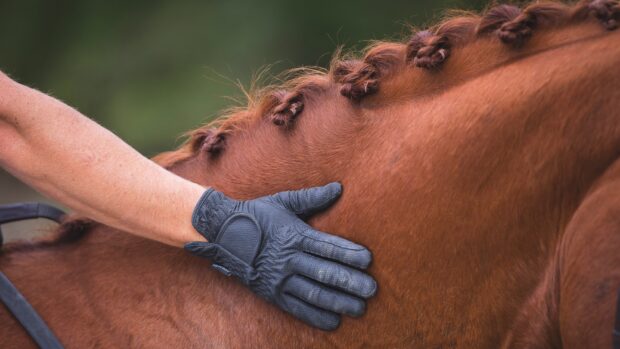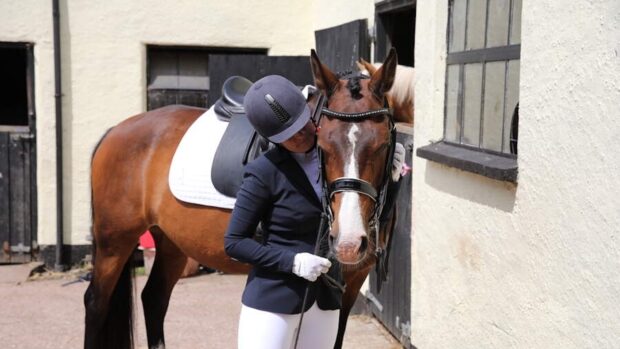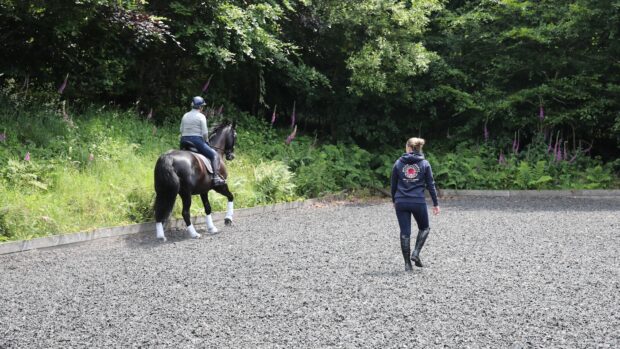The involvement of horses in sport is ethically justifiable, research has found – as long as certain conditions are met to ensure they have good lives throughout.
Madeleine Campbell, an owner, rider and breeder as well as a specialist in equine reproduction, and European diplomate in animal welfare science, ethics and law, carried out the study, which was published in Sport, Ethics and Philosophy.
She told H&H it is something she has been working on for years, and that given the increased discussion and awareness of the importance of public acceptance of the involvement of horses in sport, “we need to be able to articulate why we think it’s ethically justifiable”.
“The equestrian sector needs to be able to explain to the public why we can make a sound ethical argument that justifies the involvement of animals in sport; an awful lot of people are arguing that it isn’t ethical,” she said.
Professor Campbell referred to studies carried out by World Horse Welfare that found 20% of respondents do not support horse sport in any form, and 40% would only support it if horse welfare were improved. She also cited work by the ethics and wellbeing commission for the FEI, which found nearly three quarters of equestrians felt that sport horses’ welfare should be improved, and added that she herself wanted to know whether horses’ involvement is “the right thing”.
Her research involved three common ethical theories: deontology, utilitarianism and virtue ethics. The first is rules-based ethics; once a rule is established, the ethical thing to do is to follow it regardless. Utilitarianism says the most ethical choice is the one that will produce the greatest good for the greatest number, and virtue ethics hold virtues central.
Professor Campbell’s paper argues that when each is used to consider involvement of horses in sport, “only absolutist rights theory [such as which might be held by the 20% entirely against horse sport] leads to a negative conclusion”.
But this depends, she adds, on horses’ welfare being protected, not only so negative welfare effects are minimised but so positive effects are maximised to ensure a good life for them. The other caveats are “identification of and mitigation against avoidable, unnecessary risk and compliance with governing body regulations and the law”.
“It doesn’t follow that an animal is necessarily better off without human contact,” Professor Campbell added. “An animal’s life in the wild can be harsh.
“It’s about supplying positive welfare, and the more we understand about equine behaviour and human interactions, the better we’ll be able to do that.”
Professor Campbell said a “life worth living” is the idea that there is a minimum level, which balances positive and negative experiences, so the horse’s overall experience is positive. She said she has thought about this in detail; no being can go through life without any negatives but, for example, the benefit of being free from disease is well worth the negative experience of a vaccination.
“We need to be able to explain why involvement of horses in sport is ethically justified and this paper explains that, providing caveats are met,” she said.
Professor Campbell added that more knowledge on when horses are happy, rather than not unhappy, would be beneficial, and the paper concludes by saying current rules need to be considered as to whether they are adequate or could be improved, to meet the criteria above.
“Protection of horse sport”
One welfare-related rule that has come under much discussion recently is the ethics committee’s recommendation to the FEI that double bridles be optional rather than mandatory in all levels of dressage.
Researcher Sue Dyson, former head of orthopaedics at the Animal Health Trust, has written to the FEI regarding this, and the “precautionary principle”.
“I am writing because I care passionately about the protection of horse sports but recognise that the equine industry has to be seen to reflect on current practices, and to be proactive in instituting change to demonstrate that equine welfare is at the forefront of our minds,” she said. “I was somewhat surprised by the dismissal by the FEI of the proposal… that the use of a double bridle should become optional for grand prix dressage. I understand that decisions need to be based on scientifically robust information, however whenever there is an element of doubt in my opinion the welfare of horses should come first.”
The FEI replied to Dr Dyson to say its dressage committee had suggested a multidisciplinary team of experts be formed to “develop study/research to understand all pros and cons about the proposed change”, which would mean “the community will be in a position to have an informed, conscious and well-balanced opinion on the matter”.
Dr Dyson told H&H she has been considering for years how it would be possible to research whether double bridles affect horse welfare; how to remove the bias of the rider’s effect, and measure the impact of long-term use, for example, and cover the huge number of variables affecting equine welfare and performance.
“Evidence we’ve accrued through observational studies does suggest a question mark over double bridles’ use,” she said. “Studies we did using the ridden horse pain ethogram [a set of equine behaviours that may indicate pain or discomfort] showed that mouth opening and separation of the teeth were much more common in grand prix dressage horses [than other horses], which to me says there must be a reason. The double bridle, the rider’s rein cues, or combined with what the horse is being asked to do – these are the questions we must ask.”
Dr Dyson believes we must identify, and be seen to identify, what is causing these signs of discomfort in some horses, to help support the public acceptance of horses’ involvement in sport.
“I strongly believe that there is a lack of understanding about what constitutes meaningful research,” she said in a reply to the FEI. “I think that we are living in cloud cuckoo-land if we think that a robust study could be designed and sufficient funding provided in order to conclude unequivocally that equine welfare may be compromised by the use of a double bridle. There are just too many potentially variable factors.”
She added: “So we have to rely on observational studies, which were not designed to address the issue of double bridles but nonetheless provide strong evidence that double bridles (or grand prix dressage – I would prefer not to think this) are not good for horses.”
World Horse Welfare chief executive Roly Owers told H&H the debate over the proposal to make double bridles optional is “a great example of how equestrianism needs to evolve our approach into more ethical decision-making to strengthen our social licence to operate”.
“Ethically, the public and equestrians want horse sport to operate in a way that avidly protects the welfare of each individual horse. No two horses are the same, including when it comes to the anatomy of the mouth, so it only seems right to allow the rider to decide what is best for their horse,” he said. “We need to ask ourselves what is more important: the comfort and performance of the horse or tradition and the ability of the rider to use a piece of equipment? I know how many would expect us to answer.
“We also need to take an ethical approach when assessing and acting on evidence. When we know of growing evidence that something is a risk to equine welfare, it becomes increasingly unjustifiable to maintain the status quo. And waiting for more conclusive evidence will not absolve us of disregarding those risks. The public will only continue to support horses in sport, leisure or any other activity if we do right by our horses, and are proactive in putting welfare first. These words will sound increasingly hollow if we do not err on the side of the precautionary principle.”
A spokesman for the FEI told H&H, on double bridles: “The FEI currently believes this is a sport matter and, for the time being, we do not have scientific evidence to support any welfare concern. However, we do need to define the next step in the process and involve our stakeholders in the research.”
You might also be interested in:

The horse world must be brave and proactive as many do not support horse sport

*Opinion* Scaremongering clickbait, or a very real threat to the sport we all love?
Three quarters of riders think horse welfare needs improving

Subscribe to Horse & Hound magazine today – and enjoy unlimited website access all year round
Horse & Hound magazine, out every Thursday, is packed with all the latest news and reports, as well as interviews, specials, nostalgia, vet and training advice. Find how you can enjoy the magazine delivered to your door every week, plus options to upgrade your subscription to access our online service that brings you breaking news and reports as well as other benefits.




